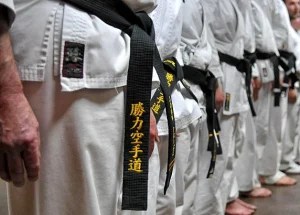It’s no secret that parents and educators alike are always on the lookout for ways to improve children’s cognitive development. From music lessons to chess clubs, there are countless extracurricular activities that claim to boost academic performance and cognitive skills. But what if we told you that the answer to improved cognitive development could be found in an unexpected place? That’s right, we’re talking about jiu jitsu self defense instruction. Discover the remarkable benefits of jiu-jitsu training in enhancing cognitive skills, fostering discipline, and promoting overall personal growth in children.
While some may scoff at the idea of martial arts as an academic pursuit, research suggests that jiu-jitsu training can have significant cognitive benefits for students. In this article, we’ll explore the empirical evidence behind the cognitive benefits of jiu-jitsu training, including its potential to improve focus and concentration, analytical and critical thinking skills, and memory and attention span.
Whether you’re a parent, educator, or student yourself, you won’t want to miss out on the fascinating ways jiu-jitsu training can enhance cognitive development.
Key Takeaways
- Jiu-jitsu training can enhance cognitive skills, including attention span, memory, and problem-solving abilities.
- Engaging in structured physical activity that incorporates mindfulness exercises can positively impact academic performance.
- Jiu-jitsu training provides a sense of accomplishment and builds confidence, which can translate into a student’s academic work.
- Practicing jiu-jitsu aids in stress management, leading to improved cognitive function.
Enhancing Cognitive Skills through Jiu-Jitsu Training
Jiu-jitsu training has been found to enhance cognitive skills among students, providing an effective means of improving their mental abilities.
Research has shown that practicing jiu-jitsu aids in stress management, which is a crucial component in promoting cognitive development. By engaging in jiu-jitsu, students learn to manage their stress levels, which can lead to improved cognitive function, such as better memory retention, decision-making skills, and problem-solving abilities.
Moreover, jiu-jitsu training instills confidence in students, which is another important aspect of cognitive development. Confidence building enhances self-esteem, reduces anxiety, and promotes a positive attitude towards learning, leading to better academic performance.
Therefore, jiu-jitsu training can be a valuable tool in enhancing students’ cognitive skills, helping them to become better learners and more successful individuals.
Developing Focus and Concentration
Just as a sculptor must focus intently on the chisel in their hand to create a masterpiece, the practice of jiu-jitsu can foster focus and concentration skills in individuals.
The mind-body connection is a crucial aspect of this martial art, as it requires the practitioner to be fully present in the moment.
Jiu-jitsu training involves a combination of physical and mental exercises that promote mindfulness techniques, such as deep breathing and visualization.
These techniques not only help students to remain focused and attentive during their training but also carry over into other areas of their lives, such as their academic studies.
Research has shown that regular practice of jiu-jitsu can enhance cognitive skills, including attention span, memory, and problem-solving abilities.
By training in jiu-jitsu, students can develop their focus and concentration skills, improve their overall cognitive functioning, and cultivate a greater sense of mental clarity and wellbeing.
Improving Analytical and Critical Thinking Skills
Improving analytical and critical thinking skills can be enhanced by engaging in the mental exercises involved in the practice of jiu-jitsu, which require individuals to be fully present in the moment and develop mindfulness techniques.
Jiu-jitsu training demands logical reasoning, quick problem-solving techniques, and situational awareness, all of which are useful in developing analytical and critical thinking skills.
By practicing jiu-jitsu, students learn to analyze their opponents’ movements and find ways to counter them, which develops their problem-solving skills.
Jiu-jitsu also teaches students to be calm and collected under pressure, which is a crucial element of critical thinking.
Moreover, jiu-jitsu students learn to think creatively while finding solutions to complex problems, which is essential in analytical thinking.
Overall, jiu-jitsu training is an excellent way to improve cognitive development, particularly in analytical and critical thinking skills.
Boosting Memory and Attention Span
Research has shown that engaging in certain physical activities may have a positive effect on memory and attention span.
Jiu-jitsu training, in particular, can help students improve these cognitive functions.
Memory techniques, such as repetition and visualization, are integral to learning jiu-jitsu techniques. Practicing these techniques repeatedly helps students to remember them more easily.
Additionally, jiu-jitsu training involves mindfulness exercises, which require students to focus their attention on their breathing and body movements. Such exercises can help to enhance attention span and improve the ability to concentrate.
By engaging in jiu-jitsu training, students can boost their memory and attention span, which can have a positive impact on their academic performance and overall cognitive development.
Improving Academic Performance through Jiu-Jitsu Training
Engaging in a structured physical activity that incorporates mindfulness exercises has the potential to positively impact academic performance.
Studies have shown that jiu-jitsu training can improve a student’s academic performance by increasing their motivation and bettering their time management skills.
Jiu-jitsu training provides a sense of accomplishment and builds confidence, which can translate into a student’s academic work.
Additionally, the discipline and focus required in jiu-jitsu training can lead to improved time management skills, allowing a student to better prioritize their academic responsibilities.
This combination of increased motivation and better time management can lead to improved academic performance, making jiu-jitsu training a valuable tool for students seeking academic success.
Conclusion
Jiu-jitsu training has been found to have numerous benefits for students’ cognitive development. Through the practice of this martial art, students can improve their focus and concentration, analytical and critical thinking skills, memory, and attention span. These skills can all contribute to improved academic performance, making jiu-jitsu training a valuable addition to a student’s routine.
One of the key benefits of jiu-jitsu training is its ability to enhance focus and concentration. This is achieved through the need to pay close attention to movements and techniques during training, as well as the need to be alert and aware of one’s surroundings. As students develop this skill, they may find it easier to concentrate during academic tasks such as studying or taking exams.
Another benefit of jiu-jitsu training is its ability to improve analytical and critical thinking skills. This is achieved through the need to analyze opponents’ movements and develop strategies to overcome them. As students develop these skills, they may find it easier to apply them to academic tasks such as problem-solving and critical analysis.
In conclusion, jiu-jitsu training can have a significant impact on students’ cognitive development, including improving focus and concentration, analytical and critical thinking skills, memory, and attention span. By incorporating this martial art into their routine, students can reap the benefits of improved academic performance and overall cognitive function. As the saying goes, ‘a healthy mind in a healthy body’ – and jiu-jitsu training is one way to achieve both.
You May Also Like:


